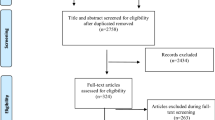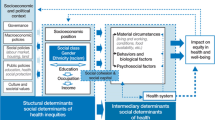Abstract
In recent years, the concept of vulnerability has emerged in bioethics eroding the primacy of the autonomous and self-sufficient individual of the mainstream approach, regarding vulnerability as an obstacle to be removed. The Covid-19 pandemic has underscored an awareness that is not new, yet often little considered, namely that vulnerability is both a universal condition, and a special state dependent on social and economic causes, making the traditional concept of health inadequate to provide answers in the healthcare field. The aim of the work is to examine how the pandemic has challenged the well-being conception of health, and the impact on healthcare and healthcare workers of a definition of health based on vulnerability. Indeed, the connection between health and vulnerability has some practical implications. Particularly, it can shift the focus to vulnerability of healthcare professionals, who have always been considered almost immune from it with the effect of obscuring the dimension of reciprocity between the patient and the physician. The Covid-19 pandemic has made a contribution in the process already began of rethinking health in the light of vulnerability, by bringing out the notion of relational health, and stressing the need to educate to a new approach, in order to increase the wellbeing of all subjects involved in the caring relationship.
Similar content being viewed by others
Notes
“L’uomo per definizione deve capire di essere limitato, altrimenti non è più in quella condizione che lo rende bisognoso dell’altro, anch’egli fragile. Due fragilità che si aiutano a vivere creano un rapporto. L’amore è l’unione tra due fragilità che ti permette di vivere” (translation mine).
“(Non si può essere vivente senza essere vulnerabile. Se non si parte da qui, ogni etica della cura rischia di risolversi in un appello paternalistico e supererogatorio, che si sovrappone a un improbabile) ‘grado zero’ dell’autonomia individuale” (translation mine).
“(…) una partecipazione responsabile all’ordine del bene” (translation mine).
“Ogni sofferenza è vissuta come un’alterità da esorcizzare, è esperita come patologica, anormale. Il nostro corpo, scomposto in una serie di organi da curare e proteggere, è una minaccia, un involucro che decisamente non resiste ai colpi! E, così come accade per i rischi fisici, anche l’angoscia e la sofferenza esistenziale non sono tollerate: qualsiasi fragilità deve essere eliminata” (translation mine).
“Dalla rilevazione della fragilità discende quindi non un’etica del disimpegno ma, al contrario, una nuova costellazione di virtù morali e di conseguenza una diversa giustificazione, intersoggettivamente motivata, dell’etica della cura” (transalation mine).
References
Alibudbud, Rowalt. 2023. Addressing the burnout and shortage of nurses in the Philippines. SAGE Open Nursing 9: 23779608231195736. https://doi.org/10.1177/23779608231195737
Alici, Luigi. 2016. Il fragile e il prezioso: bioetica in punta di piedi. 1st ed. Il Pellicano Rosso. Nuova Serie 242. Brescia: Morcelliana.
Beach, Mary Catherine, Thomas Inui, and the Relationship-Centered Care Research Network. 2006. Relationship-centered care. Journal of General Internal Medicine 21: S3–S8. https://doi.org/10.1111/j.1525-1497.2006.00302.x
Benasayag, Miguel. 2010. La salute ad ogni costo: medicina e biopotere. Milano: Vita e pensiero.
Boldt, Joachim. 2019. The concept of vulnerability in medical ethics and philosophy. Philosophy Ethics and Humanities in Medicine: PEHM 14: 1–8. https://doi.org/10.1186/s13010-019-0075-6
Bombaci, Nunzio. 2015. Per una medicina dialogica: Juan Rof Carballo, scienziato e filosofo. 1st ed. Studia Humaniora Volume XIII. Napoli: Orthotes.
Bon, Giuseppe. 2020. Disorientamento e pandemia da Coronavirus: tra pedagogia ed etica nei sistemi sanitari. In La persona, la cura, le professioni. La vulnerabilità umana e i sistemi socio-sanitari in tempo di pandemia, ed. Francesca Marin. 103–119. Padova: Proget.
Bradley, Kent L., Thomas Goetz, and Sheila Viswanathan. 2018. Toward a contemporary definition of health. Military Medicine 183: 204–207. https://doi.org/10.1093/milmed/usy213
Bruni, Luigino. 2020. La ferita dell’altro: economia e relazioni umane. Bologna: Marietti 1820.
Butler, Judith. 2004. Precarious life: The powers of mourning and violence. London, New York: Verso.
Card, Alan J. 2017. Moving beyond the WHO definition of health: A new perspective for an aging world and the emerging era of value-based care. World Medical & Health Policy 9: 127–137. https://doi.org/10.1002/wmh3.221
Delgado, Janet. 2018. The relevance of the ethics of vulnerability in bioethics. Les Ateliers de l’Éthique 12: 154–179. https://doi.org/10.7202/1051280ar
Delgado, Janet. 2021. Vulnerability as a key concept in relational patient-centered professionalism. Medicine, Health Care, and Philosophy 24: 155–172. https://doi.org/10.1007/s11019-020-09995-8
Engelhardt, H., Tristram. 1975. The concepts of health and disease. In Evaluation and explanation in the biomedical sciences: Proceedings of the first trans-disciplinary symposium on philosophy and medicine held at Galveston, May 9–11, 1974, ed. H. Tristram Engelhardt and Stuart F. Spicker, 125–141. Philosophy and Medicine. Dordrecht, Netherlands: Springer. https://doi.org/10.1007/978-94-010-1769-5
Fineman, Martha Albertson. 2008. The vulnerable subject: Anchoring equality in the human condition. Yale Journal of Law and Feminism 20: 1–23.
Fineman, Martha Albertson. 2010. The vulnerable subject and the responsive state. Emory Law Journal 60: 251–275.
Fineman, Martha Albertson. 2012. Elderly as vulnerable: Rethinking the nature of individual and societal responsibility. SSRN Electronic Journal. https://doi.org/10.2139/ssrn.2088159
Fineman, Martha Albertson. 2019. Vulnerability in law and bioethics. Journal of Health Care for the Poor and Underserved 30: 52–61.
Frenk, Julio, Lincoln C. Chen, Latha Chandran, Elizabeth O. H. Groff, Roderick King, Afaf Meleis, and Harvey V. Fineberg. 2022. Challenges and opportunities for educating health professionals after the COVID-19 pandemic. Lancet (London England) 400: 1539–1556. https://doi.org/10.1016/S0140-6736(22)02092-X
Gehlen, Arnold. 1988. Man, his nature and place in the world. European perspectives. New York: Columbia University Press.
Haque, Omar Sultan, and Adam Waytz. 2012. Dehumanization in medicine: Causes, solutions, and functions. Perspectives on Psychological Science 7: 176–186. https://doi.org/10.1177/1745691611429706
Heath, C., A. Sommerfield, and B. S. von Ungern-Sternberg. 2020. Resilience strategies to manage psychological distress among healthcare workers during the COVID-19 pandemic: A narrative review. Anaesthesia 75: 1364–1371. https://doi.org/10.1111/anae.15180
Herring, Jonathan. 2016. Health as vulnerability; interdependence and relationality. New Bioethics 22: 18–32. https://doi.org/10.1080/20502877.2016.1151255
Holmér, Suzana, Ann-Charlotte Nedlund, Kristin Thomas, and Barbro Krevers. 2023. How health care professionals handle limited resources in primary care - an interview study. BMC Health Services Research 23: 6. https://doi.org/10.1186/s12913-022-08996-y
Leonardi, Fabio. 2018. The definition of health: Towards new perspectives. International Journal of Health Services: Planning Administration Evaluation 48: 735–748. https://doi.org/10.1177/0020731418782653
Mackenzie, Catriona. (ed.) 2014. Vulnerability: New essays in ethics and feminist philosophy. Studies in Feminist Philosophy. New York: Oxford University Press.
Malterud, Kirsti, Lise Fredriksen, and Gjerde Mette Haukaas. 2009. When doctors experience their vulnerability as beneficial for the patients: A focus-group study from general practice. Scandinavian Journal of Primary Health Care 27: 85–90. https://doi.org/10.1080/02813430802661811
Maragno, Giorgia. 2018. Alle origini (terminologiche) della vulnerabilità: vulnerabilis, vulnus, vulnerare. In Vulnerabilità: analisi multidisciplinare di un concetto, eds. Orsetta Giolo, and Baldassarre Pastore. 1st ed., 13–35. Roma: Carocci. Biblioteca di testi e studi.
Marin, Francesca. 2020. Dall’evento straordianario della pandemia all’aspetto ordinario della vulnerabilità umana. In La persona, la cura, le professioni: la vulnerabilità umana e i sistemi socio-sanitari in tempo di pandemia, ed. Francesca Marin. 9–16. Padova: Proget.
Marin, Francesca. 2022. La reciprocità nella relazione di cura: profili bioetici. In Cura e reciprocità. Volume 1, eds. Valter Gaintin, and Giovanni Guandalini. 33–40. Bologna: Il mulino.
Marinaci, Tiziana, Claudia Venuleo, and Giulia Savarese. 2021. The COVID-19 pandemic from the health workers’ perspective: Between health emergency and personal crisis. Human Arenas: 1–21. https://doi.org/10.1007/s42087-021-00232-z
Maunder, Robert G. William J. Lancee, Reet Mae, Leslie Vincent, Nathalie Peladeau, Mary Agnes Beduz, Jonathan J. Hunter and Molyn Leszcz. 2010. Computer-assisted resilience training to prepare healthcare workers for pandemic influenza: A randomized trial of the optimal dose of training. BMC Health Services Research 10: 1–10. https://doi.org/10.1186/1472-6963-10-72
Neumann, Melanie, Friedrich Edelhäuser, Diethard Tauschel, Martin R. Fischer, Markus Wirtz, Christiane Woopen, Aviad Haramati, and Christian Scheffer. 2011. Empathy decline and its reasons: A systematic review of studies with medical students and residents. Academic Medicine 86: 996–1009. https://doi.org/10.1097/ACM.0b013e318221e615
Nielsen, Lasse. 2021. Pandemic prioritarianism. Journal of Medical Ethics 48: 236–239. https://doi.org/10.1136/medethics-2020-106910
Orsi, Luciano, and Pier Luigi Galli Stampino. 2018. Dolore. Milano: In dialogo.
Parolari, Enrico. 2022. L’antropologia del limite. Un dialogo con Vittorino Andreoli. Tredimensioni 19: 272–282.
Pontifical Academy for Life. 2023a. Global pandemic and universal brotherhood. https://www.academyforlife.va/content/pav/en/news/2020/pandemic-and-universal-brotherhood.html. Accessed May 8.
Pontifical Academy for Life. 2023b. Vaccines for all. https://www.academyforlife.va/content/pav/en/news/2021/vaccines-for-all.html. Accessed May 8.
Shadmi, Efrat, Yingyao Chen, Inês Dourado, Inbal Faran-Perach, John Furler, Peter Hangoma, Piya Hanvoravongchai et al. 2020. Health equity and COVID-19: Global perspectives. International Journal for Equity in Health 19: 104. https://doi.org/10.1186/s12939-020-01218-z
Smeltzer, Suzanne C., Linda Carman, Copel, Patricia K. Bradley, Linda Tina Maldonado, Christine D. Byrne, Jennifer Dean Durning, Heather Brom, Janell L. Mensinger, and Jennifer Yost. 2022. Vulnerability, loss, and coping experiences of health care workers and first responders during the covid-19 pandemic: A qualitative study. International Journal of Qualitative Studies on Health and Well-being 17: 1–17. https://doi.org/10.1080/17482631.2022.2066254
Tamata, Adel Tutuo, and Masoud Mohammadnezhad. 2023. A systematic review study on the factors affecting shortage of nursing workforce in the hospitals. Nursing Open 10: 1247–1257. https://doi.org/10.1002/nop2.1434
ten Have, Henk. 2016. Vulnerability: Challenging bioethics. 1st ed. London, New York: Routledge, Taylor & Francis Group.
ten Have, Henk, and Bert Gordijn. 2021. Vulnerability in light of the COVID-19 crisis. Medicine Health Care and Philosophy 24: 153–154. https://doi.org/10.1007/s11019-021-10013-8
ten Have, Henk. 2022a. The Covid-19 pandemic and global bioethics. Cham: Springer.
ten Have, Henk. 2022b. COVID-19 y bioética global. Medicina y Ética 33: 19–83. https://doi.org/10.36105/mye.2022v33n1.01
The Lancet. 2020. Redefining vulnerability in the era of COVID-19. The Lancet 395. London, UK: Elsevier Limited. https://doi.org/10.1016/S0140-6736(20)30757-1
Tsonis, Orestis, Kalliopi Diakaki, Fani Gkrozou, Aikaterini Papadaki, Evangelos Dimitriou, Maria Paraskevaidis, Maria Kyrgiou et al. 2021. Psychological burden of covid-19 health crisis on health professionals and interventions to minimize the effect: What has history already taught us? Riv Psichiatr 56: 57–63.
Van Spijk, Piet. 2002. Positive and negative aspects of the WHO definition of health, and their implications for a new concept of health in the future. In Person, society and value: Towards a personalist concept of health, ed. Kateryna Fedoryka Cuddeback, Paulina Taboada, and Patricia Donohue-White, Philosophy and Medicine vol. 72, 1st ed., 209–227. Dordrecht, Netherlands: Springer.
Verza, Annalisa. 2018. Il concetto di vulnerabilità e la sua tensione tra colonizzazioni neoliberali e nuovi paradigmi di giustizia. In Vulnerabilità: Analisi multidisciplinare di un concetto, ed. Orsetta Giolo and Baldassarre Pastore, 1st ed. Biblioteca di testi e studi. Roma: Carocci.
Vizcaino, Gilberto, and Gilberto Esparza José. 2020. Ethical conflicts in COVID-19 times. The Journal of Infection in Developing Countries 14: 968–970. https://doi.org/10.3855/jidc.13137
Xafis, Vicki. 2020. What is inconvenient for you is life-saving for me’: How health inequities are playing out during the COVID-19 pandemic. Asian Bioethics Review 12: 223–234. https://doi.org/10.1007/s41649-020-00119-1
Zilio, Federico. 2020. La deumanizzazione nel limbo dei disordini della coscienza. In La persona, la cura, le professioni. La vulnerabilità umana e i sistemi socio-sanitari in tempo di pandemia, ed. Francesca Marin. 43–56. Padova: Proget.
Author information
Authors and Affiliations
Corresponding author
Ethics declarations
Conflicts of interest
The author declares no potential conflicts of interest with respect to the research, authorship, and/or publication of this article. The views, thoughts, and opinions expressed in this article belong solely to the author.
Additional information
Publisher’s Note
Springer Nature remains neutral with regard to jurisdictional claims in published maps and institutional affiliations.
Electronic supplementary material
Below is the link to the electronic supplementary material.
Rights and permissions
Springer Nature or its licensor (e.g. a society or other partner) holds exclusive rights to this article under a publishing agreement with the author(s) or other rightsholder(s); author self-archiving of the accepted manuscript version of this article is solely governed by the terms of such publishing agreement and applicable law.
About this article
Cite this article
Girotto, S. Vulnerability and the Covid-19 pandemic: educating to a new notion of health. International Journal of Ethics Education 8, 291–307 (2023). https://doi.org/10.1007/s40889-023-00175-9
Accepted:
Published:
Issue Date:
DOI: https://doi.org/10.1007/s40889-023-00175-9




